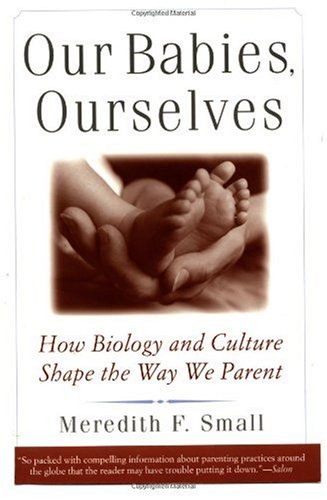Temperament in Babies as an Evolutionary Adaptation
It might also be difficult to extend the categories of temperament across cultures when the categories mean different things in different environments. For example, "difficult" babies in Western cultures are those who do not sleep for long periods and those who cry. Under a different caretaking package, these reactions would not even show up. More important, there is no reason to assume that what is "bad" in one culture will end up "bad" in another culture. Dutch researcher Marten de Vries followed a set of Masai infants in Kenya during a period of great drought in die I970s7^ He labeled babies "difficult" or "easy" based on his observation and the application of Western categories of adaptability, intense reactions, regularity, and whether or not they were manageable. He also used the standard Western Infant Temperament Questionnaire, modified for the Masai (he had to delete questions about going to the doctor and add questions about being carried), to ask parents how they perceived their babies. He wanted to categorize the babies on a continuum of temperament, and so he concentrated on the ten easiest and ten most difficult babies as his subjects. Returning three months later, he sought out the parents of the twenty babies at the extremes but found the parents of only thirteen—Masai are, after all, nomadic people. The parents had been dealing for years with the destruction that a drought causes to people who make their living off the land, and all the babies were already malnourished. In the following three months, during some of the worst of the drought, seven of the thirteen infants he had located died. But interestingly, only one of the so-called difficult babies, as categorized by Western criteria, were dead, while six of those he labeled as easy were dead. De Vries surmised that traits we perceive as difficult under ample conditions might be more beneficial to survival during times of nutritional stress. A "bad" temperament might be evolutionarily advantageous under certain circumstances or in certain environments. In times of nutritional deprivation, it may be the fretful baby that gets the most milk, or is picked up most often. It is only in our affluence that we use the negative word "difficult" to describe the fact that the baby is evolutionarily designed to gain attention. The perceptions of temperament, in other words, are relative.
Notes:
Difficult babies in Western cultures are better able to survive harsh conditions in Third World cultures.
Folksonomies: parenting babies adaptation temperament
Taxonomies:
/family and parenting/babies and toddlers (0.536964)
/family and parenting/children (0.299901)
/religion and spirituality (0.299211)
Keywords:
difficult babies (0.953165 (positive:0.060333)), Adaptation Difficult babies (0.899212 (positive:0.448097)), so-called difficult babies (0.813045 (negative:-0.494657)), Infant Temperament Questionnaire (0.686451 (neutral:0.000000)), Western cultures (0.670997 (negative:-0.054409)), Dutch researcher Marten (0.652017 (neutral:0.000000)), different caretaking package (0.646404 (neutral:0.000000)), World cultures (0.566172 (positive:0.448097)), Masai infants (0.560970 (neutral:0.000000)), great drought (0.559662 (neutral:0.000000)), harsh conditions (0.547120 (positive:0.448097)), different things (0.542651 (negative:-0.227466)), long periods (0.537892 (negative:-0.502506)), different environments (0.537623 (negative:-0.227466)), intense reactions (0.536137 (positive:0.468138)), thirteen infants (0.533244 (negative:-0.400976)), die I970s7^ (0.530874 (neutral:0.000000)), nomadic people (0.528069 (neutral:0.000000)), fretful baby (0.526923 (negative:-0.474421)), Western categories (0.526521 (positive:0.422439)), nutritional deprivation (0.525464 (negative:-0.611558)), ample conditions (0.523821 (negative:-0.589158)), negative word (0.521218 (negative:-0.693737)), certain circumstances (0.521007 (neutral:0.000000)), Western criteria (0.519247 (neutral:0.000000)), nutritional stress (0.516355 (negative:-0.589158)), certain environments (0.515047 (neutral:0.000000)), parents (0.493337 (negative:-0.532549)), Vries (0.466575 (negative:-0.589158)), questions (0.441997 (negative:-0.370023))
Entities:
Western Infant Temperament Questionnaire:PrintMedia (0.851314 (neutral:0.000000)), Marten de Vries:Person (0.775847 (negative:-0.589158)), nomadic people:FieldTerminology (0.607261 (negative:-0.724222)), Third World:FieldTerminology (0.472934 (positive:0.448097)), Kenya:Country (0.418710 (neutral:0.000000)), researcher:JobTitle (0.404714 (neutral:0.000000)), three months:Quantity (0.404714 (neutral:0.000000))
Concepts:
Infant (0.979669): dbpedia | freebase | opencyc
Cultural anthropology (0.674285): dbpedia | freebase | opencyc
Culture (0.656576): dbpedia | freebase | opencyc
Perception (0.583445): dbpedia | freebase | opencyc
Western culture (0.574216): dbpedia | freebase | yago
Milk (0.533168): dbpedia | freebase | opencyc
Infant mortality (0.504588): dbpedia | freebase
Pregnancy (0.480898): dbpedia | freebase | opencyc





